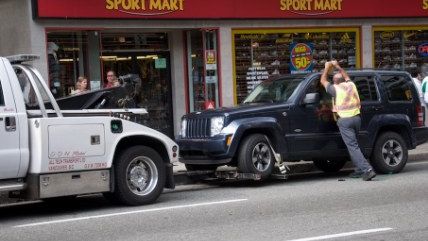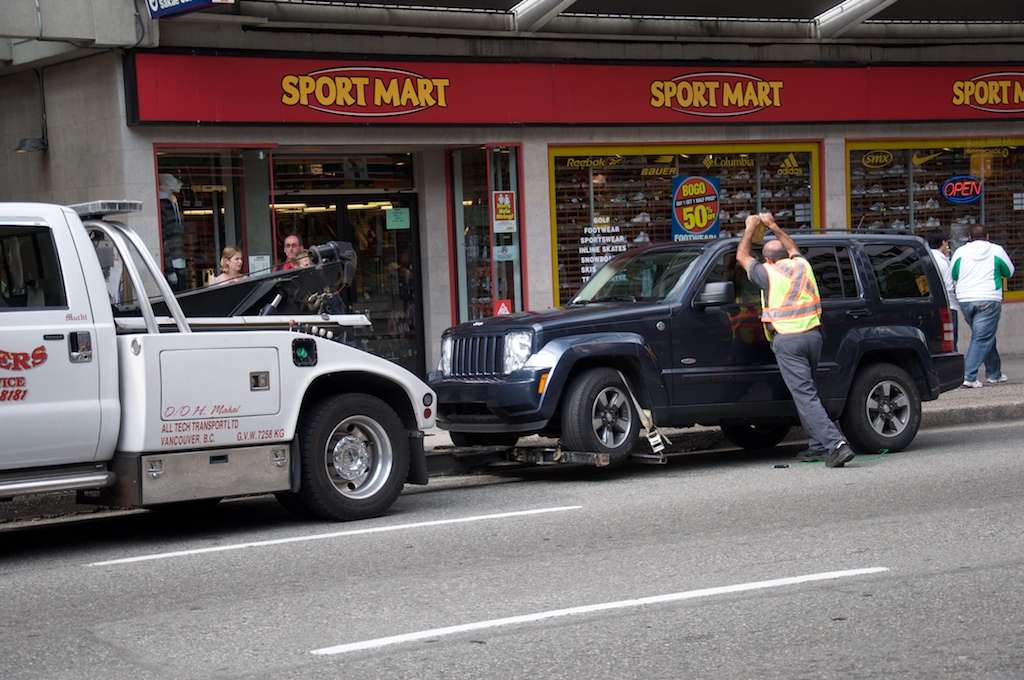New Mexico Cities Attempt to Ignore Tough Restrictions on Property Seizure. Lawsuits Follow.
Albuquerque continues snatching and selling cars through civil, not criminal, program.


Remember that amazing property rights and due process victory earlier this year when New Mexico passed one of the strongest laws restricting asset forfeiture in the United States? Not only did it require that citizens be convicted of crimes before having their property and money permanently taken by law enforcement, it also directed the revenue from forfeiture into the state's general fund rather than to police departments. Police could no longer take property from citizens without proving they had committed crimes, and the profit motive for doing so had been erased. It was wonderful! It's probably the best reform of asset forfeiture rules ever passed.
Anyway, some police are apparently ignoring the law. I believe the appropriate sound effect is the sad trombone's "womp womp."
What is happening is that some cities seem to think that the new asset forfeiture rules don't apply to their own ordinances. Albuquerque has a vehicle seizure program that snatches cars from people accused of crimes, particularly cases of drunken driving. They have not stopped this program. In fact they seem to be pushing it more than ever to bring in revenue for city police.
Now the city of Albuquerque is being sued by two state senators representing Albuquerque (one a Democrat, one a Republican) to try to stop it. They're being represented by the property-rights-fighting lawyers for the Institute for Justice, which had helped push for the reform in the first place. Here's how the Santa Fe New Mexican describes the city's vehicle seizure program:
Robert Johnson, an attorney with the [Institute for Justice], said Albuquerque was named in the lawsuit is because it has the oldest and largest civil forfeiture program in the state.
And it's the most profitable, too. According to the Institute for Justice, the Albuqueruque program seizes more than 1,000 cars a year and brings in more than $1 million annually to city coffers. The program is so successful that the city approved $2.5 million in new bonds to purchase a larger parking lot to store the seized vehicles. The revenue from the program is used to pay the salaries of those who are its most vocal defenders, as well as for new equipment and travel.
According to the complaint, the city's 2016 budget anticipates seizing 1,200 vehicles, releasing 350 of them, immobilizing 600 and selling 625 at auction.
Programs such as the one in Albuquerque, Johnson said, "create a financial incentive to take property from people who have done no wrong." Even if the owner of the car was not the driver, the car can be seized, Johnson said. And, he added, "That profit incentive turns law enforcers into lawbreakers."
City attorneys for both Albuquerque and Santa Fe are arguing that the law, as passed, does not apply to specific ordinances passed by cities. An editorial by the Albuquerque Journal says there has been one judge's ruling that this is indeed the case and that the new forfeiture rules do not apply to seizure programs put into place by municipalities.
If that's the case, that's a pretty big loophole that legislators need to close, or else we could see a proliferation of New Mexico cities passing their own laws to restore civil (non-criminal) asset forfeiture systems. It's hard enough for state legislators to go against the wishes of law enforcement and prosecutors. It's almost impossible for elected city officials to defy them.
More from the Institute for Justice on the lawsuit here. Read the full legislation New Mexico passed if you like here.
Editor's Note: As of February 29, 2024, commenting privileges on reason.com posts are limited to Reason Plus subscribers. Past commenters are grandfathered in for a temporary period. Subscribe here to preserve your ability to comment. Your Reason Plus subscription also gives you an ad-free version of reason.com, along with full access to the digital edition and archives of Reason magazine. We request that comments be civil and on-topic. We do not moderate or assume any responsibility for comments, which are owned by the readers who post them. Comments do not represent the views of reason.com or Reason Foundation. We reserve the right to delete any comment and ban commenters for any reason at any time. Comments may only be edited within 5 minutes of posting. Report abuses.
Please to post comments


I'm gonna just put this in the "How many divisions does the Pope have?" file.
Now the city of Albuquerque is being sued by two state senators representing Albuquerque (one a Democrat, one a Republican) to try to stop it.
Do they have standing?
Uh, you may need a quick primer on causality because that appears to be precisely what was done.
Their summary detailing forfeiture procedure neglects to mention that in settling with the city to avoid forfeiture, the city agrees to release the vehicle?for a small consideration, based on the value of the vehicle, and often in the thousands of dollars. Is your junker not worth the several hundred dollars it would take to get it back? Can't afford a couple grand on top of attorney fees to get the thing out of hock? Too bad! Thanks for the car, sucker.
Dealing with Albuquerque's scummy city attorney's office as a legal assistant ranked among the worst aspects of the job. They were sleazy, smug, and extremely paranoid that somebody, somewhere, might get to keep their own property without paying top dollar for the privilege.
Oh, and
This is a nifty little trick. The vehicle may not be seized in the legal sense for alleged first-time offenders, but it is towed and impounded with the owner on the hook for the substantial fees resulting. As far as I can recall, and mind you it has been a few years since I worked for an attorney, the owner is still under the ten-day limit before forfeiture proceedings may begin.
Yes, in an administrative hearing under a preponderance of evidence standard, e.g. almost nobody successfully contests their seizure.
Holly Holm lives in Albuquerque. They should put her in charge of internal police investigations, and turn off the cameras in the interrogation room.
And miss the show? Never!
If things were as they should be, the entire concept of civil asset forfeiture would have been stopped by the Supreme Court ruling it to be a violation of 5th Amendment private property rights.
Or failing that, rule that it can only apply in the situations for which it was first implemented over 200 years ago, when the owner of the property seized (typically a trading vessel) was a foreign national who was not in the United States at the time the property was seized, and thus could not be prosecuted.
the appropriate sound effect is the sad trombone's "womp womp."
If that's what sad trombone sounds like to you, I suggest getting your hearing checked.
Huh. Cops breaking the law. I'm shocked. Sho...
Ah, screw it. Sad how common this is.
Instead of filing a suit, they should send the state police down there to arrest some folks for GTA. That would probably get the message across a lot quicker.
I envy your optimism.
Oh, I have no hope that something like that would actually happen. But it would be a lot more effective than two years' worth of dancing lawyers.
It's always wise to remember that when you pass a law reigning in government's ability to act, government will engage in its own personal libertarian moment and ignore those pieces of paper with laws written on them.
Wait, there's a New Mexico?
It's only slightly less corrupt than Old Mexico.
You just passed the intelligence test for employment with the Transportation Security Agency.
I would say that the city officials need to make the closest examination of the local jail house, from inside one of it's cells, with the doors locked and the officials inside,looking out through the bars.